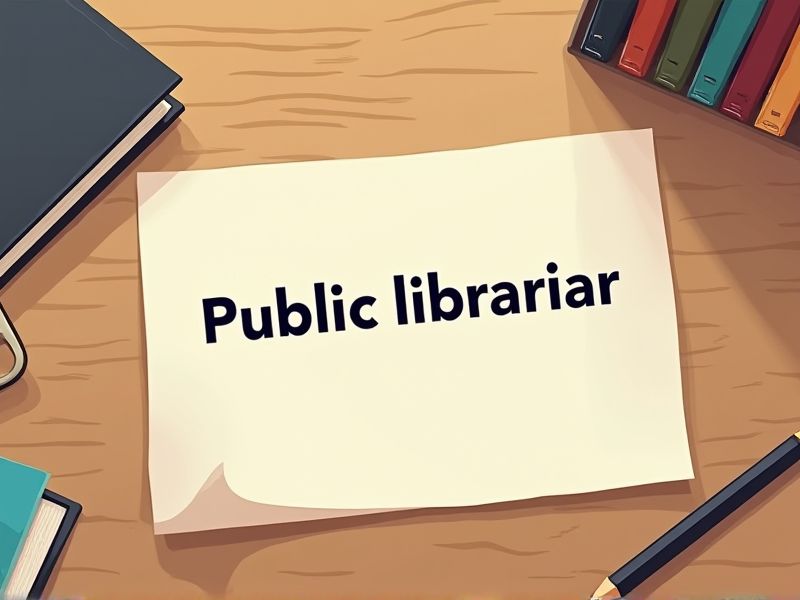
Public librarians often require certain certifications to ensure they are equipped with the necessary skills for effective information management and community engagement. Certification programs provide librarians with specialized knowledge in areas like digital literacy, archival work, and information technology. These qualifications help librarians adapt to the evolving demands of library services in the digital age. Below are some essential certifications that might benefit a public librarian.
Master of Library and Information Science (MLIS) from an ALA-accredited institution
Pursuing a Master of Library and Information Science (MLIS) from an ALA-accredited institution ensures that public librarians receive training aligned with industry standards, which is crucial for maintaining effective library services. A degree from such a prestigious program hones a librarian's skills in information management and digital literacy, essential in the rapidly evolving technology landscape. Many public library systems require the MLIS as a minimum credential for leadership positions, emphasizing its role in career advancement. Accreditation by the American Library Association signifies a high-quality education that prepares librarians to address diverse community needs effectively.
State Library Certification
State Library Certification ensures public librarians meet established educational standards, enhancing their ability to serve diverse communities effectively. It instills trust in patrons, as certified librarians are recognized for their professional competencies. The certification often allows libraries to qualify for certain funding and grants, which require staff credentials to ensure proper resource management. Continuous certification requirements encourage librarians to engage in ongoing education and skill development, aligning library services with evolving public needs and technological advances.
Certified Public Library Administrator (CPLA)
The CPLA certification provides public librarians with specialized management and leadership skills necessary for effectively running library operations. Training through CPLA enhances a librarian's ability to address community needs by implementing strategic programs and services. CPLA-certified librarians are often better equipped to manage budgets and secure funding, crucial for sustaining and expanding library resources. This certification also helps ensure the librarian can navigate complex policy and legal frameworks impacting library services.
Digital Literacy and Information Skills Certification
Public librarians often face the challenge of assisting patrons with access to digital resources and technology. Acquiring a Digital Literacy and Information Skills Certification equips them with essential tools to effectively manage digital inquiries. The certification enhances their ability to guide the community in navigating information in a digitally-driven society. This specialized training ensures librarians remain relevant and competent in a constantly evolving digital landscape.
Community Engagement Strategies Certification
Community Engagement Strategies Certification equips public librarians with the skills to effectively collaborate with diverse community groups, fostering trust and communication. This certification enhances a librarian's ability to identify and address the specific needs of their community, paving the way for more inclusive library programs. By understanding these strategies, librarians can create targeted initiatives that drive library participation and public value. As community expectations evolve, this certification ensures librarians remain proactive in adapting services to meet changing demands.
Library Technology Specialist Certification
Library Technology Specialist Certification equips public librarians with advanced digital skills, which enhances their ability to manage and implement new technologies effectively within the library. As libraries increasingly serve as digital access points, certified specialists ensure that patrons receive optimal support in navigating various technological resources. The certification provides librarians with updated knowledge on cybersecurity, digital cataloging, and data management, crucial for safeguarding patron information and optimizing library operations. Consequently, having certified specialists in libraries contributes to bridging the digital divide within communities, fostering equal access to information.
Records Management Certification
Records management certification equips public librarians with the skills to handle, organize, and preserve digital and physical documents efficiently. As regulations around data privacy and information governance increase, this certification ensures that librarians can comply with legal and ethical standards. It aids in optimizing library operations by streamlining access to essential records and reducing clutter. Certification enhances a librarian's ability to educate patrons on best practices for managing personal records, increasing community trust and engagement.
Library Instruction Certification
Library Instruction Certification equips public librarians with essential skills for teaching and guiding patrons effectively, enhancing the overall user experience in a library setting. By obtaining this certification, librarians can provide structured educational programs, which in turn can lead to increased community engagement and higher library usage. Certification ensures that librarians stay updated with the latest instructional strategies, supporting their ability to address diverse learning needs. As libraries become more integral to lifelong learning, certified librarians play a crucial role in facilitating access to information and resources.
Research Data Management Certification
Research Data Management Certification equips public librarians with essential skills in organizing, preserving, and providing access to data, enhancing their ability to support researchers and the public effectively. Increased data literacy among librarians leads to improved data-driven decision-making and efficient handling of information resources. Certifications foster credibility and trust, encouraging more patrons to utilize the library's research services. As data becomes increasingly integral to research, having certified librarians ensures libraries remain relevant and competent in meeting evolving community needs.
Project Management Professional (PMP) Certification
Possessing a PMP Certification enhances a public librarian's ability to manage complex projects, such as community outreach programs or library renovations, ensuring tasks are completed on time and within budget. It provides librarians with essential skills in risk management and resource allocation, important for upgrading library technology or expanding services. Having PMP-certified librarians can improve communication and coordination across departments, leading to improved service delivery and user satisfaction. It can also elevate the library's reputation, attracting funding and support for new initiatives.
Summary
Gaining certifications enhances your skills as a public librarian, increasing your capacity to serve the community effectively. With these new credentials, you gain access to broader career opportunities and potential for advancement. The certifications also augment your ability to engage with diverse technological resources, improving the library's offerings. This advanced proficiency can lead to increased patron satisfaction and library usage rates.
